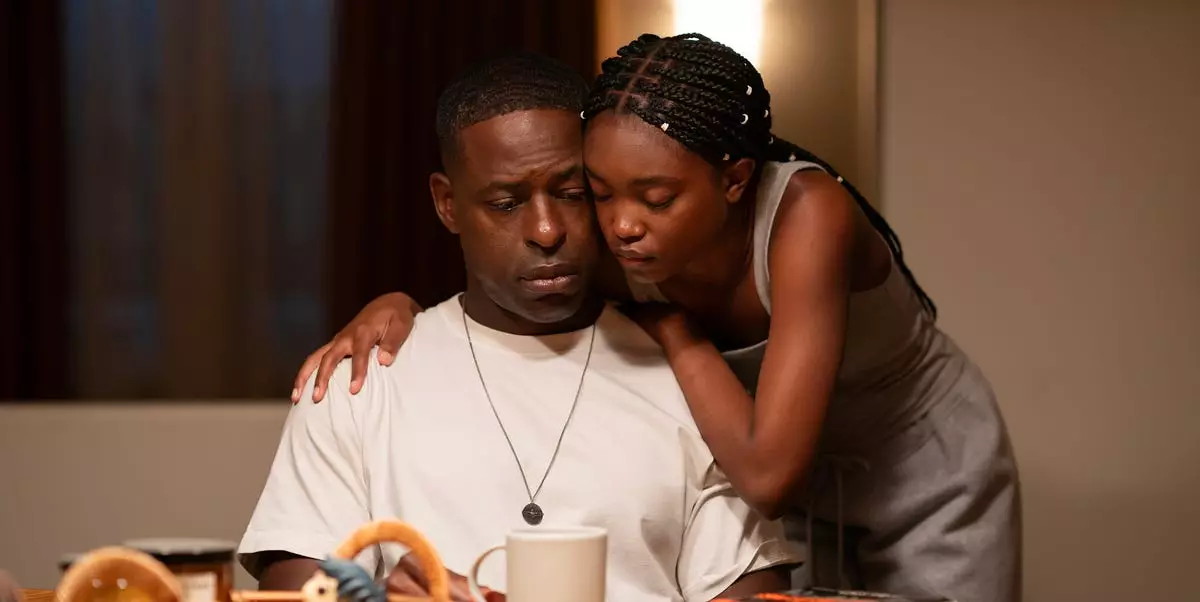Hulu’s final episode of *Paradise* serves as a gripping examination of deception, ambition, and the shadows that lurk within the facades of a seemingly utopian society. Opening with a pivotal flashback, the narrative transports viewers twelve years prior, revealing the backstory of the construction team tasked with creating what they believe to be a “recycling facility.” This blatant misrepresentation of a project fraught with dark undertones sets the tone for a tale that blends suspense with critical commentary on authority and corporate malfeasance.
The lead character Trent, played by Ian Merrigan, spotlights a crucial theme in the episode: the suppression of dissent against a powerful apparatus that forecloses discussions about health and safety in the name of progress. His eventual firing for voicing concerns over toxic materials serves not just as a plot device, but as a pointed critique of how often the voices of the few go unheard when they challenge those in power. Trent’s trajectory from whistleblower to despondent actor—who contemplated assassination to uncover the truth—is nothing short of tragic. Rather than simply being an act of desperation, it signifies how deeply established systems can crush the wills of those who care enough to challenge the status quo.
The Unraveling of Trust
The character arcs throughout this last installment weave a narrative of trust that is gradually corroded by betrayal and deception. The harrowing act of Trent’s failed assassination attempt, where he mistakenly shoots PR spin doctor Xavier (Sterling K. Brown), further complicates the connections between characters. Trent’s misguided ambition creates ripples of chaos that spread throughout Paradise, churning with moral ambiguity that compels audiences to question not just his actions, but the ethical and ideological foundations of this supposedly ‘safe’ society.
As Trent evolves into the role of the “librarian,” the show offers a poignant exploration of identity and redemption—how one’s choices can transform them into something nearly unrecognizable. He initially appears consumed by his revenge quest, but in his new guise, he finds a strange sense of belonging in the environment he had once sought to dismantle. This juxtaposition creates a layered character whose journey forces viewers to grapple with ideas of justice, imprisonment, and liberation. Is Trent a victim of circumstance, or are his complicated choices merely a reflection of the world around him?
The Intersection of Power and Control
Xavier’s relentless pursuit of truth and justice ultimately leads him to discover a heavily guarded book laden with secrets about Paradise. Here lies the crux of the series; through his explorations and the brutal realizations that follow, he uncovers the chilling complexities of control. The hidden truths in the president’s notes mirror the overarching narrative of suppression, demonstrating an elite class’s capacity to manufacture consent through manipulation of information. The audience is left to ponder the unsettling reality of how easily knowledge can transform into a weapon against oppression.
Moreover, the episode builds toward its climactic conclusion with tense encounters, particularly between Xavier and Trent. When their paths converge, it is not merely a physical confrontation but a deep philosophical clash about the nature of morality in a world riddled with corruption. Trent’s last moments—a desperate rant about the manipulation of the populace and the façade of a utopian paradise—suggest that in efforts to construct a better world, a darker truth is often unearthed.
The Aftermath of Loss and Reclamation
In a chilling twist, the episode culminates with betrayal among close comrades, with Jane’s shocking act of violence against Sinatra serving as a demonstration of how rapidly relationships fracture in a climate of fear and desperation. Jane’s motivations bring forth another crucial theme: the intensity of parental love, despite being warped into a violent act. Her resolution to protect her interests highlights how the lines between right and wrong can blur as individuals grasp at fleeting moments of agency in a world that feels suffocatingly deterministic.
In the end, Xavier’s journey takes a hopeful turn, as he reclaims a semblance of familial life with his children. Yet, the lingering questions about the fate of his wife, Teri, amplify the overarching mystery of Paradise, reminding viewers that hope and despair often dance together in tense harmony. The promise of a potential season two tantalizingly opens the door to further explorations of these complex themes, urging a deeper investigation into what happens when the veneer of paradise is stripped away, revealing the dystopian underbelly that truly lies beneath.


Leave a Reply